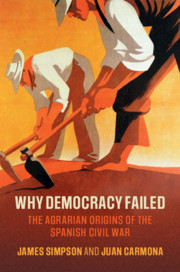Book contents
- Why Democracy Failed
- Cambridge Studies in Economic History
- Why Democracy Failed
- Copyright page
- Dedication
- Contents
- Figures
- Maps
- Tables
- Acknowledgements
- Notes on the Regional Division of Spain
- Abbreviations
- Introduction
- Part I The European Experience: Economic and Political Development, 1870–1939
- Part II Spanish Agriculture, Economic Development, and Democracy
- Part III Explaining the Weakness of the Family Farm
- Part IV Rural Elites, Poverty, and the Attempts at Land Reform
- Part V Rural Conflicts and the Polarization of Village Society
- 9 Creating Parties, Political Alliances, and Interest Groups: Rural Politics in the 1930s
- 10 The Growing Polarization of Rural Society during the Second Republic
- Conclusion
- Book part
- Glossary
- Bibliography
- Index
10 - The Growing Polarization of Rural Society during the Second Republic
from Part V - Rural Conflicts and the Polarization of Village Society
Published online by Cambridge University Press: 17 April 2020
- Why Democracy Failed
- Cambridge Studies in Economic History
- Why Democracy Failed
- Copyright page
- Dedication
- Contents
- Figures
- Maps
- Tables
- Acknowledgements
- Notes on the Regional Division of Spain
- Abbreviations
- Introduction
- Part I The European Experience: Economic and Political Development, 1870–1939
- Part II Spanish Agriculture, Economic Development, and Democracy
- Part III Explaining the Weakness of the Family Farm
- Part IV Rural Elites, Poverty, and the Attempts at Land Reform
- Part V Rural Conflicts and the Polarization of Village Society
- 9 Creating Parties, Political Alliances, and Interest Groups: Rural Politics in the 1930s
- 10 The Growing Polarization of Rural Society during the Second Republic
- Conclusion
- Book part
- Glossary
- Bibliography
- Index
Summary
This final chapter therefore attempts to answer two questions that are crucial to explaining why so many people had become disillusioned with parliamentary democracy. First, it shows why apparently modest reforms, such as the introduction of collective bargaining or the providing of emergency assistance to workers through temporary land settlements, become so contentious and, in particular, why employers and labour organizations were so intransigent. Second, it explains why conflicts became widespread across Spain, appearing not just in areas of latifundios, but also in villages where land was not heavily concentrated. After briefly examining the theoretical literature on rural conflicts and the scale and scope of contentious behavior in the Spanish countryside between 1931 and 1936, it looks at case studies of conflicts involving casual harvest labourers in Southern Spain, and tenant farmers or yunteros in Extremadura.
- Type
- Chapter
- Information
- Why Democracy FailedThe Agrarian Origins of the Spanish Civil War, pp. 226 - 246Publisher: Cambridge University PressPrint publication year: 2020

